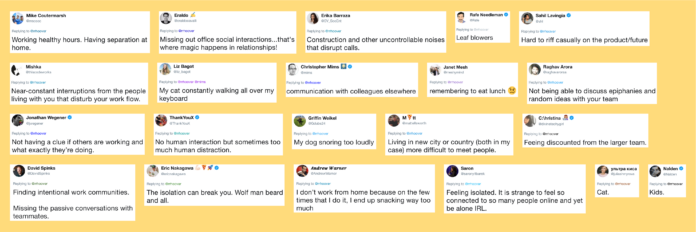Overview
Though widespread remote work has not existed long enough for comprehensive study, anecdote helps us understand the psychological impacts of working from home. The added stress of remote work affects not only the personal psyche but the workforce as a whole. Once clear lines between work and home blur to indistinguishable, coordination across time zones becomes a hassle, and general human interaction decreases. This is important, and potentially destructive, from the perspective of a manager and also to the millions of people who work every day.
Takeaways
- “Work” and “life” are becoming undifferentiated, especially during remote work
- This could be both a positive and/or a negative – positive because it (forcibly) improves candor and genuine interaction, negative because it very quickly bleeds into burnout
- How may we establish clear lines between work and home without the bounds of a traditional office space?
Excerpts
- Loneliness might be the most common issue expressed by remote workers.
- Disconnecting is hard when your home is your office. This is challenged further when teammates work 24/7 across different time zones.
- Distractions occur in the office but it can be even more challenging at home, especially for those with kids
- Water cooler serendipity can inspire the next big idea. In-person communication is better suited for “shower thoughts” and unplanned ideation.
- Communication remotely remains a challenge. [Apps like Zoom were] not designed for ongoing collaboration between more than two people
- Respect is a less obvious issue for remote workers, especially in companies that have a “face time” culture
Stakeholders
- Remote workers and team members
Hoover, Ryan. “The Problems in Remote Working.” Medium, Medium, 17 Mar. 2019, medium.com/@rrhoover/the-problems-in-remote-working-1a6f165585d.




